人教版新目标八年级英语
【人教版新目标】英语八年级上册Unit5单元教案
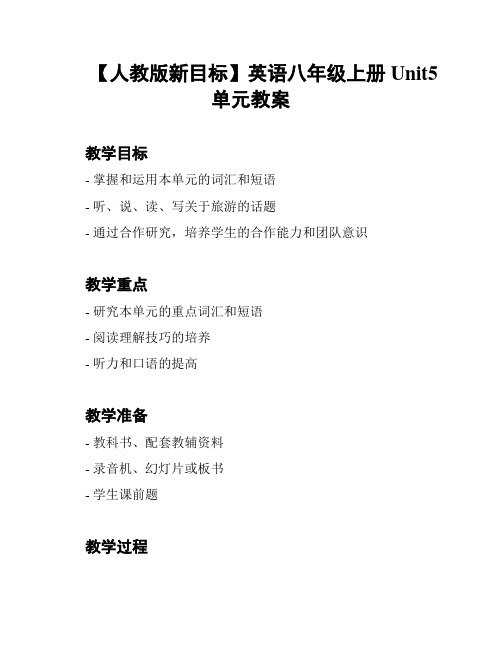
【人教版新目标】英语八年级上册Unit5单元教案教学目标- 掌握和运用本单元的词汇和短语- 听、说、读、写关于旅游的话题- 通过合作研究,培养学生的合作能力和团队意识教学重点- 研究本单元的重点词汇和短语- 阅读理解技巧的培养- 听力和口语的提高教学准备- 教科书、配套教辅资料- 录音机、幻灯片或板书- 学生课前题教学过程Step 1: 预导入- 利用图片和实物引入本单元的话题,激发学生的研究兴趣,并探讨相关问题。
- 利用问答的形式复和巩固与旅游相关的词汇和短语。
Step 2: 听力训练- 借助录音机或多媒体工具播放有关旅游的对话或短文,帮助学生提高听力技巧,并通过听后问题的设置检查学生的听力理解能力。
Step 3: 语言输入- 导入新课文,通过幻灯片或板书呈现课文,并解释生词和短语的意思,帮助学生掌握课文的内容。
Step 4: 听读训练- 学生跟读课文,注意语音语调和语速训练,提高学生的口语表达能力。
Step 5: 合作研究- 将学生分成小组,让他们合作完成教材上的活动和练,通过合作研究培养学生的合作能力和团队意识。
Step 6: 课堂巩固- 设置相关的问答题和小组讨论,加深学生对课文内容的理解和运用能力。
Step 7: 课后作业- 布置课后练,包括听力、阅读和写作练,巩固学生对本单元内容的掌握。
教学评价- 通过观察学生在课堂上的表现、听力测试、口语训练和书面作业的评改等方式,全面评价学生的研究情况和能力提升。
参考资料- 人教版《新目标英语》八年级上册教材- 相关配套教辅资料。
新版人教版新目标英语八年级上册全册教案
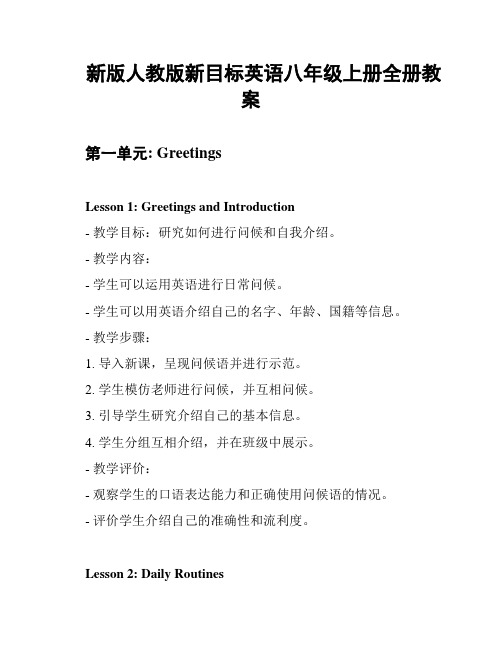
新版人教版新目标英语八年级上册全册教案第一单元: GreetingsLesson 1: Greetings and Introduction- 教学目标:研究如何进行问候和自我介绍。
- 教学内容:- 学生可以运用英语进行日常问候。
- 学生可以用英语介绍自己的名字、年龄、国籍等信息。
- 教学步骤:1. 导入新课,呈现问候语并进行示范。
2. 学生模仿老师进行问候,并互相问候。
3. 引导学生研究介绍自己的基本信息。
4. 学生分组互相介绍,并在班级中展示。
- 教学评价:- 观察学生的口语表达能力和正确使用问候语的情况。
- 评价学生介绍自己的准确性和流利度。
Lesson 2: Daily Routines- 教学目标:研究描述日常活动。
- 教学内容:- 学生能够运用英语描述自己的日常活动。
- 学生可以用英语叙述一天的活动安排。
- 教学步骤:1. 复前一课的内容,引导学生回忆日常活动的英语表达。
2. 引导学生研究新的日常活动的词汇和句型。
3. 学生分组分享自己的一天活动安排,并向全班汇报。
- 教学评价:- 观察学生对日常活动词汇和句型的掌握程度。
- 评价学生的口语表达和沟通能力。
第二单元: Hobbies and Leisure ActivitiesLesson 1: Hobbies- 教学目标:研究谈论自己的兴趣爱好。
- 教学内容:- 学生可以用英语描述自己的兴趣爱好。
- 学生可以运用所学词汇进行对话练。
- 教学步骤:1. 复前一课的词汇和句型。
2. 引导学生研究新的兴趣爱好词汇。
3. 学生分组进行对话练,谈论自己的兴趣爱好。
- 教学评价:- 观察学生对兴趣爱好词汇的掌握情况。
- 评价学生在对话练中的口语表达能力。
Lesson 2: Leisure Activities- 教学目标:研究谈论闲暇活动。
- 教学内容:- 学生能够用英语描述自己的闲暇活动。
- 学生能够与他人交流关于闲暇活动的话题。
- 教学步骤:1. 复前一课的词汇和句型。
【人教版】新目标八年级英语上册:Unit 1 单元教学设计

【人教版】新目标八年级英语上册:Unit 1 单元教学设计一. 教材分析人教版新目标八年级英语上册Unit 1主要围绕“How do you get to school?”这一主题展开,通过引入不同交通工具的图片和情景对话,让学生掌握一般现在时的表达方式,以及询问和回答他人如何去学校的句子结构。
教材通过丰富的语言材料,旨在培养学生的听说读写技能,提高他们的语言运用能力。
二. 学情分析八年级的学生已经掌握了基本的英语语法和词汇,具备一定的听说读写能力。
他们在学习过程中需要更多的实际语境和实践机会来提高语言运用能力。
此外,学生对于新事物的接受能力较强,但部分学生可能对英语学习缺乏兴趣,需要教师通过有趣的教学活动来激发他们的学习热情。
三. 教学目标1.知识目标:学生能够掌握一般现在时的表达方式,学会用英语询问和回答他人如何去学校。
2.能力目标:学生能够在实际情境中运用所学知识进行交流,提高听说读写技能。
3.情感目标:培养学生热爱生活,关注环保的价值观。
四. 教学重难点1.重点:一般现在时的表达方式,以及询问和回答他人如何去学校的句子结构。
2.难点:如何运用所学知识进行实际交流,提高语言运用能力。
五. 教学方法采用任务型教学法,通过引入真实情境,让学生在实际交流中掌握知识点。
同时运用分组合作、角色扮演等教学手段,激发学生的学习兴趣,提高他们的参与度。
六. 教学准备1.教材:人教版新目标八年级英语上册。
2.教具:多媒体设备、图片、卡片等。
3.教学资源:网络资源、相关视频等。
七. 教学过程1.导入(5分钟)利用多媒体展示不同交通工具的图片,引导学生谈论自己如何去学校。
教师通过提问学生,激发他们的学习兴趣。
2.呈现(10分钟)教师通过展示教材中的情景对话,让学生听懂并理解对话内容。
随后,引导学生跟读对话,纠正发音。
3.操练(10分钟)将学生分成小组,让他们模拟对话情景,进行角色扮演。
教师巡回指导,纠正错误,并给予鼓励。
人教版新目标八年级上册英语单词表

人教版新目标八年级英语上册课本分单元词汇表Unit1how often 多久一次exercise v.& n.锻炼skateboard v.踩滑板hardly adv.几乎不ever adv.曾,曾经once adv.一次twice adv.两次time n.次,次数surf v.在…冲浪Internet n.网络program n.节目,表演high school 高中,完全中学result n.结果active adj.活跃的,积极的for prep.对于,在…方面as for 至于,关于about adv.几乎,大约junk n.废弃的旧物junk food 垃圾食品milk n.牛奶coffee n.咖啡chip n.(食物等的)薄片cola n.可乐chocolate n.巧克力drink v.喝,饮health n.健康,健康状况how many 多少interviewer n.采访者habit n.习惯try v.试图,设法,努力of course 当然look after 照顾,照看lifestyle n.生活方式grade n.分数,成绩better adj.& adv.更好的(地)same adj.同样的,相同的as prep.像…一样different adj.不同的,有区别的difference n.不同,差异,区别unhealthy adj.不健康的maybe adv.或许,大概although conj.虽然,即使for prep.达,计grandpa n.外公,爷爷a lot of 大量,许多keep v.保持must modal v.必须less adj.更小的,较少的Unit2matter n.事情,问题have v.得(病),患(病)cold n.受凉,感冒have a cold 得了感冒stomachache n.胃痛sore adj.疼痛的back n.背,背部arm n.臂,胳膊ear n.耳朵eye n.眼睛foot n.脚,足hand n.手head n.头,头部leg n.腿,腿部mouth n.嘴neck n.脖子,颈部nose n.鼻子stomach n.胃tooth n.牙齿throat n.喉咙toothache n.牙痛fever n.发烧,发热rest v.休息honey n.蜂蜜dentist n.牙医should modal v.应该headache n.头痛shouldn't=should notago adv.以前so pron.如此,这样illness n.疾病advice n.劝告thirsty adj.渴的stress v.加压力于,使紧张(be)stressed out 有压力的,紧张的early adv.提早(地)problem n.问题way n.方法,手段,方式traditional adj.传统的believe v.相信,认为balance n.平衡,平衡状态weak adj.虚弱的,无力的herb n.草本植物,药草angry adj.愤怒的,生气的tofu n.豆腐medicine n.药物western adj.西方的everybody pron.每人,人人get v.变得few adj.很少的a few 有些,几个,少数stay v.继续是,保持important adj.重要的balanced adj.平衡的diet n.饮食,节食moment n.瞬间,片刻at the moment 此时until conj.直到…之时host family 寄宿家庭hear v.听见,听说Unit3babysit v.临时照顾(小孩)camp v.宿营plan n.& v.计划,规划Tibet 西藏hike v.徒步旅行,远足Hong Kong 香港how long 多久,多长时间away adv.向远处get back 回来send v.发送,寄postcard n.明信片San Francisco 旧金山Hawaii 夏威夷bike n.自行车ride v.乘骑n.旅行的路程sightseeing n.观光,游览fishing n.捕鱼rent v.租用,出租Italy 意大利famous adj.著名的,出名的take a vacation 去度假Greece 希腊Spain 西班牙Europe n.欧洲something pron.某物,某事lake n.湖,湖泊the Great Lakes 五大湖leave v.离开,出发countryside n.农村,乡村nature n.大自然,自然界forget v.忘记a lot 很,常常,非常finish v.结束,完成Thailand 泰国tourist n.旅行者Unit4subway n.地铁train n.火车forty num.四十fifty num.五十sixty num.六十seventy num.七十eighty num.八十ninety num.九十hundred num.一百minute n.分钟take v.花费(时间)by prep.表示交通方式by bus 乘坐公共汽车far adj.远的,遥远的how far 多远kilometer n.公里,千米shower v.淋浴quick adj.快的bicycle n.自行车early adj.早的,提早的mile n.英里stop n.车站transportation n.公共交通,运输north adj.北部的,北方的North America 北美洲part n.地区depend v.依赖,依靠depend on 视…而定river n.河,江boat n.小船by boat 乘小船must modal v.一定more adj.& adv.更多的(地)than conj.比means n.方法,手段,工具car n.小汽车town n.镇,城镇ill adj.生病的,不健康的worry v.担心,担忧,焦虑so adv.这么,那么much adv.十分,非常Unit5lesson n.课,课程another adj.又一的,再一的concert n.音乐会whom pron.谁,什么人calendar n.日历tomorrow n.& adv.明天the day after tomorrow 后天weekday n.工作日invitation n.邀请,邀请书training n.训练,锻炼chemistry n.化学American adj.美国的project n.(学校的)课题,项目matches n.比赛,竞赛whole adj.整个的,全部的over adv.从一边至另一边come over 顺便来访free adj.空闲的,有空的till conj.直到…之时Unit6outgoing adj.友好的,外向的twin adj.& n.孪生的calm adj.镇静的wild adj.鲁莽的serious adj.严肃的athletic adj.擅长运动的note n.注释mean v.表示…的意思as adv.以…的方式way n.某个方面both pron.两个(都)hers pron.她的(所有物)physics n.物理however adv.然而more than 超出in common 公有的,共有的be good at 擅长,在…方面做得好school work n.学业laugh v.笑for prep.为,给,对opposite adj.对立的view n.观点interest n.兴趣though adv.& conj.虽然necessary adj.必要的beat v.打败care v.对…在意friendship n.友情primary adj.初级的,小学的primary school 小学information n.消息,信息Units1-6wheel n.轮子woman n.女人use v.使用cheese n.干酪,奶酪sick adj.不适的,患病的body n.身体begin v.开始begin with 以…开始swimming pool 游泳池excited adj.激动的Harbin 哈尔滨safe adj.安全的,可靠的fast adj.& adv快的(地)passenger n.乘客Unit7shake n.奶昔milk shake 奶昔blender n.搅拌机turn on 打开cut v.切,割up adv.分开cut up 切碎peel v.剥,削pour v.倾倒into prep.到…里yogurt n.酸奶ingredient n.材料cup n.小茶杯watermelon n.西瓜teaspoon n.茶匙amount n.总额instruction n.命令finally adv.最后地,最终mix v.混合mix up 混合在一起popcorn n.爆米花popper n.爆米花机boil v.煮沸salt n.盐add v.加,加添add…to… 把…加到…上sandwich n.三明治bread n.面包butter n.黄油relish n.调味品lettuce n.生菜,莴苣turkey n.火鸡slice n.薄片super adj.超级的top n.顶,上部recipe n.烹调法check v.核对,检查green onion 嫩洋葱duck n.鸭子sauce n.调味汁pancake n.薄煎饼roll v.卷Unit8gift n.礼物shark n.鲨鱼aquarium n.水族馆seal n.海豹hang v.逗留,徘徊hang out 闲荡,闲逛souvenir n.纪念物win v.赢,获胜autograph n.亲笔签名prize n.奖赏,奖金visitor n.访问者,参观者outdoor adj.户外的octopus n.章鱼end n.结束monitor n.班长Chicago 芝加哥California 加利福尼亚州sleep late 睡过头drive n.驾驶off adj.休息day off 不工作rain n.雨DVD abbr.数字化视频光盘yard n.院子yard sale 庭院旧货出售luckily adv.幸运地umbrella n.雨伞raincoat n.雨衣wet adj.潮湿的competition n.竞争,比赛,竞赛player n.运动员future n.将来again adv.再一次Unit 9born v.出生record n.记录hiccup v.& n.打嗝sneeze v.& n.(打)喷嚏too…to… 太…以至于不能…golf v.& n.(打)高尔夫球Brazilian adj.巴西的national adj.国家的achievement n.成就perform v.演出,表演gymnast n.体操运动员gold n.金子adj.金的medal n.奖牌championship n.冠军称号golfer n.高尔夫球运动员become v.成为call v.把…叫做talented adj.有天赋的loving adj.慈爱的creative adj.有创造力的outstanding adj.杰出的kind adj.和蔼的unusual adj.不寻常的grandson n.孙子violinist n.小提琴手skate v.滑冰,溜冰ice skating 滑冰champion n.冠军tour v.在…旅行the US 美利坚合众国,美国well-known adj.有名的pianist n.钢琴手could modal v.能(can的过去式)hum v.作嗡嗡声,哼唱piece n.幅,篇,首accordion n.手风琴take part(in) 参加…Poland 波兰alive adj.活着的athlete n.运动员because of 因为,由于Asia 亚洲table tennis 乒乓球运动university n.大学major v.主修major in 主修,专研management n.管理number n.号码single n.单打比赛ITTF abbr.国际乒乓球联合会Unit10grow v.生长grow up 成长programmer n.电脑程序设计者computer science 计算机科学engineer n.工程师pilot n.飞行员professional adj.专业的act v.表演move v.移动dream n.梦somewhere adv.在某处exhibition n.展览artist n.艺术家part-time adj.兼职的save v.储蓄at the same time 同时hold v.举行rich adj.富有的travel v.旅行all over 到处retire v.退休yet adv.到此时resolution n.决心instrument n.器具,乐器over prep.超过fax n.传真reader n.读者fit adj.强健的communicate v.交流lady n.女士foreign adj.外国的build v.建造exchange n.& v.交换exchange student 交换生Unit11chore n.杂务dish n.盘do the dishes 洗餐具sweep v.扫除trash n.垃圾take out 取出make one's bed 整理床铺fold v.折叠living room 起居室meeting n.会议work on 从事,忙于hate v.憎恨do chores 干家务laundry n.洗衣店do the laundry 洗衣服snack n.小吃teenager n.青少年borrow v.借invite v.邀请player n.唱机care n.照顾take care of 照看feed v.喂养mine pron.我的(所有物)Unit12radio n.无线电radio station 无线电台comfortable adj舒适的seat n.座位screen n.屏幕close adj.近的service n.服务quality n.品质theater n.剧院cinema n.电影院clothing n.衣服jeans n.(pl.)牛仔裤trendy adj.时髦的teen n.青少年funky adj.时髦的,极好的easy adj.安逸的,自在的FM abbr.(广播)调频AM abbr.(广播)调幅jazz n.爵士乐worse adj.& adv.更坏的worst adj.& adv.最坏的bargain n.特价商品meal n.餐,饭positive adj.积极的negative adj.消极的dull adj.乏味的loud adj.响亮的talent n.天才talent show 才艺表演performer n.演员success n.成功act n.一段表演without prep.无,没有together adv.一起musical adj.音乐的distance n.距离near adj.近的farthest adj.& adv.最远的province n.省份southern adj.南方的still adv.还,仍然lovely adj.美丽的,可爱的northern adj.北方的enough adj.充足的,足够的Units7-12sea n.海洋DJ abbr.音乐节目主持人Los Angeles 洛杉矶central adj.中心的diner n.小饭店,路边小餐馆curry n.咖喱deli n.熟食店leader n.领导者band n.管乐队easy adj.容易的piece n.片brown bread 黑面包forbid v.禁止Forbidden City 故宫camel n.骆驼rat n.老鼠(not)at all 丝毫(也不)cow n.母牛,奶牛seriously adv.严肃地hen n.母鸡lay v.产(卵)11。
【人教版】新目标八年级英语上册:Unit 9 单元教学设计
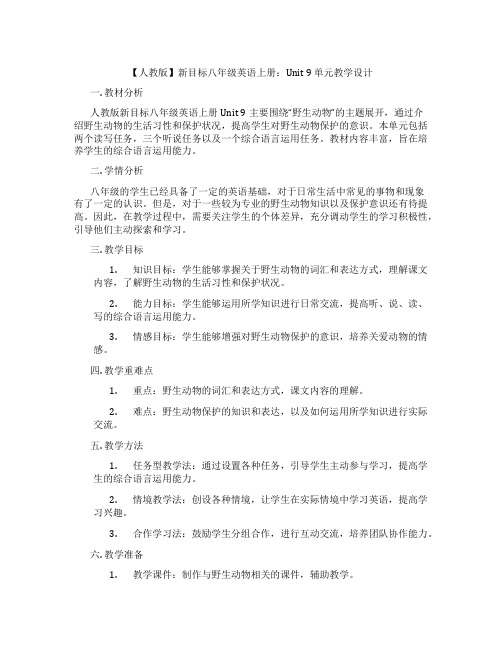
【人教版】新目标八年级英语上册:Unit 9 单元教学设计一. 教材分析人教版新目标八年级英语上册Unit 9主要围绕“野生动物”的主题展开,通过介绍野生动物的生活习性和保护状况,提高学生对野生动物保护的意识。
本单元包括两个读写任务,三个听说任务以及一个综合语言运用任务。
教材内容丰富,旨在培养学生的综合语言运用能力。
二. 学情分析八年级的学生已经具备了一定的英语基础,对于日常生活中常见的事物和现象有了一定的认识。
但是,对于一些较为专业的野生动物知识以及保护意识还有待提高。
因此,在教学过程中,需要关注学生的个体差异,充分调动学生的学习积极性,引导他们主动探索和学习。
三. 教学目标1.知识目标:学生能够掌握关于野生动物的词汇和表达方式,理解课文内容,了解野生动物的生活习性和保护状况。
2.能力目标:学生能够运用所学知识进行日常交流,提高听、说、读、写的综合语言运用能力。
3.情感目标:学生能够增强对野生动物保护的意识,培养关爱动物的情感。
四. 教学重难点1.重点:野生动物的词汇和表达方式,课文内容的理解。
2.难点:野生动物保护的知识和表达,以及如何运用所学知识进行实际交流。
五. 教学方法1.任务型教学法:通过设置各种任务,引导学生主动参与学习,提高学生的综合语言运用能力。
2.情境教学法:创设各种情境,让学生在实际情境中学习英语,提高学习兴趣。
3.合作学习法:鼓励学生分组合作,进行互动交流,培养团队协作能力。
六. 教学准备1.教学课件:制作与野生动物相关的课件,辅助教学。
2.教学素材:收集一些关于野生动物的图片、视频等素材,用于教学展示。
3.课堂活动准备:准备一些与野生动物保护相关的小游戏、小组活动等,丰富课堂氛围。
七. 教学过程1.导入(5分钟)利用图片或视频展示一些野生动物,引导学生谈论自己喜欢的动物,激发学生的学习兴趣。
2.呈现(10分钟)教师通过课件展示本节课的主要内容,包括野生动物的词汇和表达方式,以及课文内容。
新版新目标英语人教版八年级上册单词表
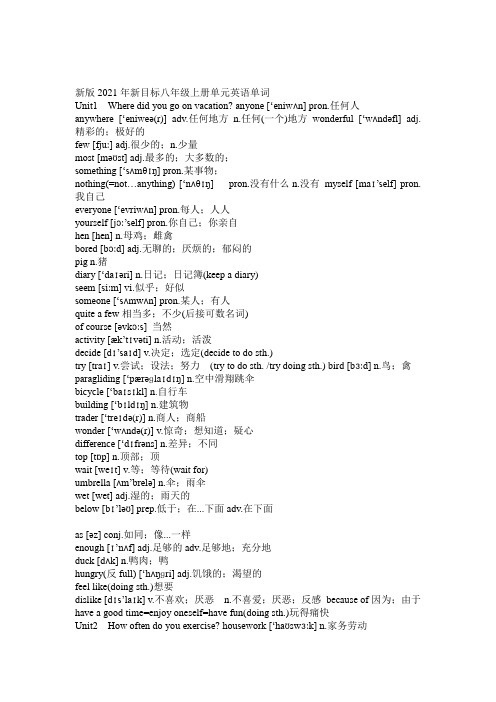
新版2021年新目标八年级上册单元英语单词Unit1 Where did you go on vacation? anyone [‘eniwʌn] pron.任何人anywhere [‘eniweə(r)] adv.任何地方n.任何(一个)地方wonderful [‘wʌndəfl] adj.精彩的;极好的few [fjuː] adj.很少的;n.少量most [məʊst] adj.最多的;大多数的;something [‘sʌmθɪŋ] pron.某事物;not hing(=not…anything) [‘nʌθɪŋ] pron.没有什么n.没有myself [maɪ’self] pron.我自己everyone [‘evriwʌn] pron.每人;人人yourself [jɔː’self] pron.你自己;你亲自hen [hen] n.母鸡;雌禽bored [bɔːd] adj.无聊的;厌烦的;郁闷的pig n.猪diary [‘daɪəri] n.日记;日记簿(keep a diary)seem [siːm] vi.似乎;好似someone [‘sʌmwʌn] pron.某人;有人quite a few相当多;不少(后接可数名词)of course [əvkɔːs] 当然activity [æk’tɪvəti] n.活动;活泼decide [dɪ’saɪd] v.决定;选定(decide to do sth.)try [traɪ] v.尝试;设法;努力(try to do sth. /try doing sth.) bird [bɜːd] n.鸟;禽paragliding [‘pærəɡlaɪdɪŋ] n.空中滑翔跳伞bicycle [‘baɪsɪkl] n.自行车building [‘bɪldɪŋ] n.建筑物trader [‘treɪdə(r)] n.商人;商船wonder [‘wʌndə(r)] v.惊奇;想知道;疑心difference [‘dɪfrəns] n.差异;不同top [tɒp] n.顶部;顶wait [weɪt] v.等;等待(wait for)umbrella [ʌm’brelə] n.伞;雨伞wet [wet] adj.湿的;雨天的below [bɪ’ləʊ] prep.低于;在...下面adv.在下面as [əz] conj.如同;像...一样enough [ɪ’nʌf] adj.足够的adv.足够地;充分地duck [dʌk] n.鸭肉;鸭hungry(反full) [‘hʌŋɡri] adj.饥饿的;渴望的feel like(doing sth.)想要dislike [dɪs’laɪk] v.不喜欢;厌恶n.不喜爱;厌恶;反感because of因为;由于have a good time=enjoy oneself=have fun(doing sth.)玩得痛快Unit2 How often do you exercise? housework [‘haʊswɜːk] n.家务劳动hardly [‘hɑːdli] adv.几乎不;简直不;刚刚ever [‘evə(r)] adv.曾经;在任何时候once [wʌns] adv.一次;曾经twice [twaɪs] adv.两倍;两次Internet [‘ɪntənet] n.因特网program [‘prəʊɡræm] n.节目;程序;课程;节目单full [fʊl] adj.满的;充满的;完全的swing [swɪŋ] n.摇摆;秋千v.摇摆;旋转maybe [‘meɪbi] adv.或许;也许;可能swing dance摇摆舞least [liːst] adj.最小的;最少的at least至少hardly ever很少;几乎从不;难得junk n.垃圾;废旧杂物coffee [‘kɒfi] n.咖啡;咖啡色health [helθ] n.健康;人的身体或精神状态result [rɪ’zʌlt] .结果;后果percent [pə’sent] adj.百分之...的online [ˌɒn’laɪn] adj.在线的adv.在线地television [‘telɪvɪʒn] n.电视机;电视节目although [ɔːl’ðəʊ] conj.虽然;尽管;然而;可是through [θruː] prep.穿过;凭借;一直到body [‘bɒdi] n.身体mind [maɪnd] .头脑;想法;意见;心思such [sʌtʃ] adj.这样的;如此的together [tə’ɡeðə(r)] adv.共同;一起die [daɪ] v.死;枯竭;消失writer [‘raɪtə(r)] n.作者;作家dentist [‘dentɪst] n.牙科医生magazine [‘mæɡəziːn] n.杂志however [haʊ’evə(r)] adv.然而;无论如何;不管多么than [ðən] conj.比almost [‘ɔːlməʊst] adv.几乎;差不多none [nʌn] pron.没有人;没有任何东西,毫无less [les] adj.更少的;较少的point [pɔɪnt] n.看法;要点;重点;小数点;目标;分数such as例如;诸如junk food n.垃圾食品;无营养食品more than超过;多于;不仅仅;非常less than不到;少于Unit3 I’m more outgoing than my sister. outgoing [‘aʊtɡəʊɪŋ] adj.外向的better [‘betə(r)] adj.更好的;较好的adv.更好地lou dly [‘laʊdli] adv.大声地;高声地;花俏地quietly [‘kwaɪətli] adv.安静地;悄悄地;平静地hard-working [hɑːd’wɜːkɪŋ] adj.勤勉的;努力工作的competition [ˌkɒmpə’tɪʃn] n.竞争;比赛fantastic [fæn’tæstɪk] adj.极好的;了不起的which adj.哪一个;哪一些pron.哪一个;哪些clearly [‘klɪəli] adv.清楚地;显然地win [wɪn] v.赢;赢得;获胜;获得n.胜利though conj.虽然;尽管;adv.不过care about关心talented [‘tæləntɪd] adj.有才能的;有天赋的truly [‘truːli] adv.真实地;真诚地;正确地care [keə(r)] v.关心;担忧;照顾;在乎serious [‘sɪəriəs] adj.严肃的;严重的;庄重的mirror [‘mɪrə(r)] n.镜子;反映necessary [‘nesəsəri] adj.必要的;必然的both [bəʊθ] adj.两者都pron.两者should [ʃəd] aux.应该;可能;应当;将要touch [tʌtʃ] vt.触摸;感动reach [riːtʃ] v.到达;伸出;达成;取得联系;延伸;(伸手)去够heart [hɑːt] n.心脏;v.打碎;折断;违背;解决;中断laugh [lɑːf] v.发笑;笑;嘲笑n.笑声;笑;笑料similar [‘sɪmələ(r)] adj.类似的share [ʃeə(r)] vt.分享,共享;分配;共有loud [laʊd] adj.大声的;adv.大声地;响亮地primary [‘praɪməri] adj.最初的,最早的be different from和...不同information [ˌɪnfə’meɪʃn] n.信息;情报;资料;通知as long as只要bring out拿出;推出the same as与...同样的in fact事实上;实际上;确切地说be similar to类似于;与...相似Unit4 What’s the best movie theater? theater [‘θɪətə] n.剧场;电影院;戏院comfortable [‘kʌmftəbl] adj.舒适的;充裕的seat [siːt] n.座位;screen [skriːn] n.屏幕;银幕close [kləʊs] v.关;合拢;不开放;停业worst [wɜːst] adj.最坏的;最差的cheaply [‘tʃiːpli] adv.廉价地;粗俗地song [sɒŋ] n.歌曲;歌唱choose [tʃuːz] v.选择;决定carefu lly [‘keəfəli] adv.小心地,认真地reporter [rɪ’pɔːtə(r)] n.记者fresh [freʃ] adj.新鲜的;清新的comfortably [‘kʌmftəbli] adv.舒服地;容易地;充裕地worse [wɜːs] adj.更坏的;更差的service [‘sɜːvɪs] n.效劳pretty [‘prɪti] adv.相当地adj.漂亮的menu [‘menjuː] n.菜单act [ækt] v.行动;表演meal [miːl] n.一餐;膳食so far到目前为止;迄今为止no problem没什么;不客气creative [kri’eɪtɪv] adj.创造的,创造性的;performer [pə’fɔːmə(r)] n.表演者;执行者talent [‘tælənt] n.天赋;才能,才艺;common [‘kɒmən] adj.常见的;共同的;普通的magician [mə’dʒɪʃn] n.魔术师;术士beautifully [‘bjuːtɪfli] adv.美丽地;完美地;role [rəʊl] n.作用;角色winner [‘wɪnə(r)] n.获胜者prize [praɪz] n.奖品;奖金everybody [‘evribɒdi] pron.每人;人人example [ɪɡ’zɑːmpl] n.例子;典范poor [pɔː(r)] adj.可怜的;贫穷的seriously [‘sɪəriəsli] 严重地,严肃地give [ɡɪv] v.给;赠予;送crowded [‘kraʊdɪd] adj.拥挤的have…in common有相同特征all kinds of各种各样;各种类型be up to是…….的职责;由…….决定play a role发挥作用;有影响makeup编造for example例如take…seriously认真对待Unit5 Do you want to watch a game show? sitcom [‘sɪtkɒm] n.情景喜剧(= situation comedy)news [njuːz] n.新闻;消息soap [səʊp] n.肥皂;肥皂剧educat ional [ˌedʒu’keɪʃənl] adj.教育的;有教育意义的plan [plæn] n.方案;方法v.打算;方案hope [həʊp] .希望;期望;盼望n.希望discussion [dɪ’skʌʃn] n.讨论;谈论stand [stænd] v.站立;忍受happen [‘hæpən] vi.发生;碰巧;出现;偶遇may [meɪ] aux.可以,能够;可能,也许expect [ɪk’spekt] v.预期;期待;盼望joke [dʒəʊk] n.笑话;玩笑v.说笑话;开玩笑comedy [‘kɒmədi] n.喜剧;滑稽;幽默事件find out查明、弄清meaningless [‘miːnɪŋləs] adj.无意义的;不重要的action [‘ækʃn] n.行为;活动cartoon [kɑː’tuːn] n.卡通;漫画culture [‘kʌltʃə(r)] n.栽培;文化;教养famous [‘feɪməs] adj.著名的;有名的appear [ə’pɪə(r)] vi.出现;出版;显得become [bɪ’kʌm] v.变成;成为rich [rɪtʃ] adj.富有的;富饶的;丰富的successful [sək’sesfl] adj.成功的;圆满的might [maɪt] aux.可能;也许;may的过去式main [meɪn] adj.主要的;最重要的reason [‘riːzn] n.原因;理由film [fɪlm] n.电影unlucky [ʌn’lʌki] adj.倒霉的;不幸的;不吉利的lose [luːz] vt.丧失;失败vi.失败ready [‘redi] adj.准备好的;乐意的character [‘kærəktə(r)] n.个性;品质;人物;simple [‘sɪmpl] adj.简单的;朴素的;单纯的;笨的army [‘ɑːmi] n.军队;陆军;一大批action movie动作片be ready to愿意迅速做某事dress up装扮;乔装打扮take sb.’s place代替;替换do a good job工作干得好;做得好Unit6 I’m going to study computer science. doctor [‘dɒktə(r)] 医生engineer [endʒɪ’nɪr] 工程师violinist [ˌvaɪə’lɪnɪst] 小提琴手pilot [‘paɪlət] 飞行员pianist [‘pɪənɪst] 钢琴家scientist [‘saɪəntɪst] 科学家college [‘kɑːlɪdʒ] 大学education [ˌedʒu’keɪʃn] 教育medicine [‘medsn] 药,医学university [ˌjuːnɪ’vɜːrsəti] 大学,高等学府article [‘ɑːrtɪkl] 文章,论文send [send] 邮寄,发送grow up长大成长computer programmer计算机管理员be sure about确信make sure确保resolution [ˌrezə’luːʃn] 决心,决定foreign [‘fɔːrən] 外国的able [ˌebəl] 能够discuss [dɪˌskʌs] 讨论,商量promise [ˌprɑmɪs] 承诺,诺言beginning [bɪˌɡɪnɪŋ] 开头,开端improve [ɪmˌpruv] 改良,改善physical [‘fɪzɪkl] 身体的self-improvement [selfɪmp’ruːvmənt] 自我改良,自我提高hobby [‘hɑːbi] 业余爱好own [oʊn] 自己的,本人的,拥有personal [‘pɜːrsənl] 个人的,私人的relationship [rɪ’leɪʃnʃɪp] 关系write down写下have to do with关于;与……有关系take up学着做;开始做agree with同意be able to能够做某事Unit 7 Will people have robots?paper [‘peɪpər] 纸pollution [pə’luːʃn] 污染;污染物prediction [prɪ’dɪkʃn] 预测future [‘fjuːtʃər] 未来pollute [pə’luːt] 污染environment [ɪn’vaɪrənmənt] 环境planet [‘plænɪt] 行星earth [ɜːrθ] n.地球;泥土plant [plænt] 种植,植物part [pɑːrt] 参加,局部peace [piːs] 和平sky [skaɪ] 天空play apart参与astronaut [‘æstrənɔːt] 宇航员apartment [ə’pɑːrtmənt] 公寓房间rocket [‘rɑːkɪt] 火箭;space [speɪs] .空间;太空even [‘iːvn] 甚至;愈加human [‘hjuːmən] 人的;n.人;人类servant [‘sɜːrvənt] 仆人dangerous [‘deɪndʒərəs] 危险的already [ɔːl’redi] 已经factory [‘fæktri] 工厂believe [bɪ’liːv] 相信disagree [ˌdɪsə’ɡriː] 不同意shape [ʃeɪp] 形状fall [fɔːl] 倒塌;跌倒possible [‘pɑːsəbl] 可能的probably [‘prɑːbəbli] 大概;或许;很可能holiday [‘hɑːlədeɪ] 假日word [wɜːrd] 单词;space station太空站over and over again屡次;反复地hundreds of许多;大量;成百上千fall down突然倒下;跌倒;倒塌look for寻找;寻求Unit 8 How do you make a banana milk shake? blender [‘blendər] 搅拌器;果汁机peel [piːl] vt.剥落;削皮pour [pɔːr] p our [pɔːr] 倒;倾倒yogurt [‘joʊɡərt] 酸奶;honey [‘hʌni] 蜂蜜watermelon [‘wɔːtərmelən] 西瓜spoon [spuːn] 勺,调羹add [æd] 增加finally [‘faɪnəli] 最后,最终salt [sɔːlt] 盐sugar [‘ʃʊɡər] 糖cheese [tʃiːz] 干酪,奶酪popcorn [‘pɑːpkɔːrn] 爆米花corn [kɔːrn] 玉米,谷物machine [mə’ʃiːn] 机器sandwich [‘sænwɪtʃ] 三明治butter [‘bʌtər] 黄油,奶油turkey [‘tɜːrki] 火鸡lettuce [‘letɪs] 莴苣,生菜piece [piːs] 件;篇;片;块;traditional [trə’dɪʃənl] 传统的traveler [‘trævlə] 旅行者England [‘ɪŋɡlənd] 英格兰;英国celebrate [‘selɪbreɪt] 庆祝;庆贺pepper [‘pepər] 胡椒粉;辣椒oven [‘ʌvn] 烤箱;烤炉cover [‘kʌvər] 遮盖,盖子,gravy [‘ɡreɪvi] 肉汁;肉汤serve [sɜːrv] 接待,效劳temperature [‘temprətʃər] 温度,气候Unit 9 Can you come to my party? prepare [prɪ’per] v.预备;准备exam [ɪɡ’zæm] 考试available [ə’veɪləbl] 可得到的;有空的;hang [hæŋ] 悬挂;(使)低垂until [ən’tɪl] 直到...的时候;直到…为止catch [kætʃ] 赶上;抓住;捕捉invite [ɪn’vaɪt] 邀请accept [ək’sept] 接受;refuse [rɪ’fjuːz] 拒绝invitation [ˌɪnvɪ’teɪʃn] 邀请;邀请函reply [rɪ’plaɪ] 答复,回复forward [‘fɔːrwərd] 转交;发送,向前的delete [dɪ’liːt] 删除preparation [ˌprepə’reɪʃn] 准备,准备工作opening [‘oʊpnɪŋ] 开幕式,落成典礼guest [ɡest] 客人concert [‘kɑːnsərt] 音乐会headmaster [ˌhed’mæstər] 校长event [ɪ’vent] 大事,公开活动calendar [‘kælɪndər] 日历,日程表Unit10 If you go to the party,you ‘ll have a great time! video [‘vɪdioʊ] 录像,录像带or ganize [‘ɔːrɡənaɪz] 组织,筹备chocolate [‘tʃɑːklət] 巧克力upset [ʌp’set] 难过,失望advice [əd’vaɪsɪ] 劝告,建议travel [‘trævl] 旅行agent [‘eɪdʒənt] 代理人,经纪人expert [‘ekspɜːrt] 专家,能手teenager [‘tiːnˌeɪdʒə] 青少年normal [‘nɔːrml] 正常的unless [ən’les] 除非,如果不certainly [‘sɜːrtnli] 当然,肯定wallet [‘wɑːlɪt] 皮夹,钱包worried [‘wɜːrid] 担忧的,烦恼的angry [‘æŋɡri] 生气的,发怒的careless [‘kerləs] 粗心的,不小心的understanding [ˌʌndər’stændɪŋ] 善解人意的,体谅人的trust [trʌst] 相信,信任mistake [mɪ’steɪk] 错误,失误careful [‘kerfl] 小心的,细致的advise [əd’vaɪz] v劝告,建议solve [sɑːlv] 解决;解答experience [ɪk’spɪriəns] 信任,经历halfway [ˌhæf’weɪ] 中途的adv.半路地else [els] 别的,其他的。
【人教版】新目标八年级英语上册:Unit8单元说课稿
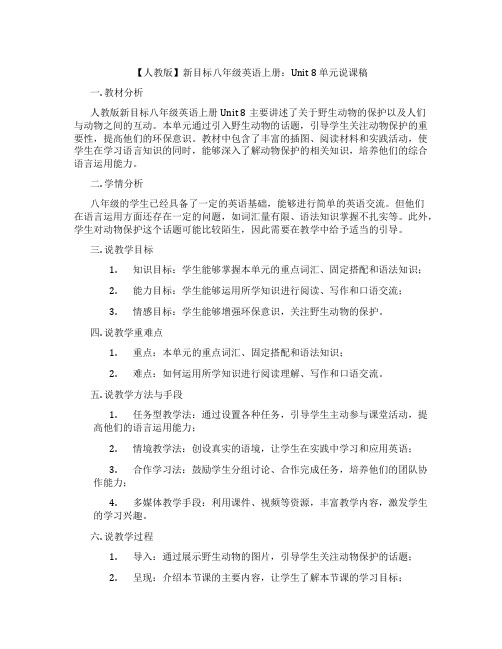
【人教版】新目标八年级英语上册:Unit 8 单元说课稿一. 教材分析人教版新目标八年级英语上册Unit 8主要讲述了关于野生动物的保护以及人们与动物之间的互动。
本单元通过引入野生动物的话题,引导学生关注动物保护的重要性,提高他们的环保意识。
教材中包含了丰富的插图、阅读材料和实践活动,使学生在学习语言知识的同时,能够深入了解动物保护的相关知识,培养他们的综合语言运用能力。
二. 学情分析八年级的学生已经具备了一定的英语基础,能够进行简单的英语交流。
但他们在语言运用方面还存在一定的问题,如词汇量有限、语法知识掌握不扎实等。
此外,学生对动物保护这个话题可能比较陌生,因此需要在教学中给予适当的引导。
三. 说教学目标1.知识目标:学生能够掌握本单元的重点词汇、固定搭配和语法知识;2.能力目标:学生能够运用所学知识进行阅读、写作和口语交流;3.情感目标:学生能够增强环保意识,关注野生动物的保护。
四. 说教学重难点1.重点:本单元的重点词汇、固定搭配和语法知识;2.难点:如何运用所学知识进行阅读理解、写作和口语交流。
五. 说教学方法与手段1.任务型教学法:通过设置各种任务,引导学生主动参与课堂活动,提高他们的语言运用能力;2.情境教学法:创设真实的语境,让学生在实践中学习和应用英语;3.合作学习法:鼓励学生分组讨论、合作完成任务,培养他们的团队协作能力;4.多媒体教学手段:利用课件、视频等资源,丰富教学内容,激发学生的学习兴趣。
六. 说教学过程1.导入:通过展示野生动物的图片,引导学生关注动物保护的话题;2.呈现:介绍本节课的主要内容,让学生了解本节课的学习目标;3.practice:通过各种练习活动,让学生巩固所学知识;4.production:设置实际情境,让学生运用所学知识进行口语交流和写作;5.总结:对本节课的内容进行归纳总结,强调动物保护的重要性。
七. 说板书设计板书设计应突出本节课的主要知识点,包括词汇、固定搭配和语法结构。
人教版新目标八年级英语上册各单元知识详解
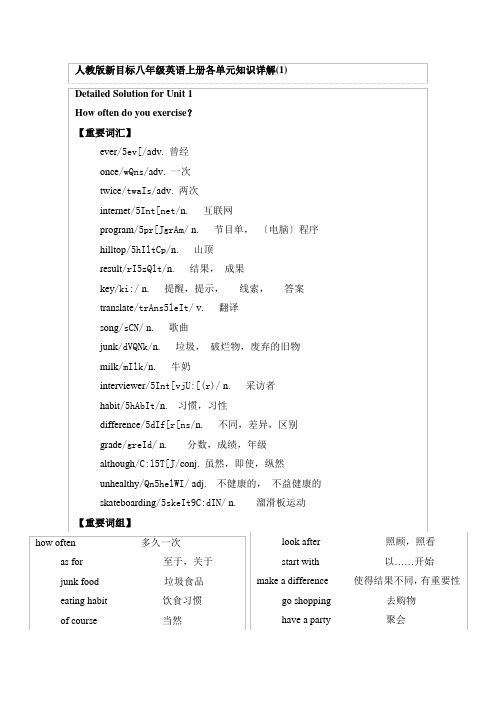
Detailed Solution for Unit 2 What’s the matter.【重要词汇】◆ matter/5mAt[/n.事情,问题,过失◆ arm/B:m/n.臂,胳膊◆ back/bAk/n.后背,背脊◆ ear/I[/n.耳朵◆ eye/aI/n.眼睛◆ foot/fJt/n.脚,足〔pl. feet/fi:t/〕◆ leg/leg/n.腿,腿部◆ neck/nek/n.脖子,颈部◆ nose/n[Jz/n.鼻子◆ stomach/5stQm[k/n.胃,胃部◆ tooth/tU:W/n.牙齿(pl. teeth/ti:W/)◆ sore/sC:,sC[/adj.疼痛的◆ stomachache/5stQm[keIk/n.胃痛,腹痛,肚子痛◆ throat/Wr[Jt/n.喉头,喉咙◆ toothache/5tU:WeIk/n.牙痛◆ fever/5fi:v[/n.发烧◆ lie/laI/v.躺,卧,平放在某处(lay, lain)◆ honey/5hQnI/n.蜂蜜◆ dentist/5dentIst/n.牙医◆ illness/5IlnIs/n.疾病,生病◆ advice/[d5vaIs/n.劝告,忠告,建议◆ thirsty/5W\:stI/adj.渴的,口渴的◆ heal/hi:l/v. 医治,治愈◆ balance/5bAl[ns/n. 平衡,平衡状态,协调◆ beef/bi:f/n. 牛肉◆ lamb/lAm/n. 小羊,羊羔,羊羔肉◆ energy/5en[dVI/n.精力,活力,能力◆ life/laIf/n. 生命,人生◆ bean/bi:n/n.豆,豆科植物◆ stray/streI/v. 远离,走失,离题◆ balanced/5bAl[nst/adj.平衡的,协调的◆ diet/5daI[t/n. 饮食,节食◆ backache/5bAkeIk/n.背痛◆ improve/Im5prU:v/v. 改善,改进,提高◆ speaking/5spi:kIN/ n. 口语◆ headache/5hedeIk/ n. 头痛◆ homestay/5h[JmsteI/ n. 待在家里◆ important//Im5pC:t[nt/adj. 重要的,重大的,严重的【重要词组】◆ have a cold患感冒◆ stressed out 紧张的,有压力的◆ bean sprout豆芽◆ get tired感觉疲惫◆ stay healthy保持健康◆ at the moment此刻,现在◆ get/ have a cold患感冒◆ see a doctor /dentist看医生/牙医◆ go to the party去参加聚会◆ make sb sick使某人不舒服(患锁病)◆ have a sore throat嗓子痛◆ have a fever发烧,发热◆ have a toothache牙痛◆ have a backache背痛◆ lie down and rest 躺下休息◆ drink lots of water 喝大量水◆ drink hot tea with honey 喝热蜂蜜茶◆ have a headache头痛◆ get tired 累了【重要词汇扩展】身体部位:head头neck颈部shoulder肩back后背leg腿thigh大腿arm手臂hand手nose 鼻子eye眼睛ear耳朵mouth嘴tooth牙齿foot脚〔注意foot的复数形式为feet,tooth的复数形式为teeth〕stomach胃throat喉咙,咽喉chest胸部pit胸口abdomen lung肺heart心脏liver 肝脏腹部waist腰backbone脊骨,脊柱hip臂部joint关节muscle肌肉nerve神经brain 脑疾病:cancer癌 influenza , flu流感 cough咳嗽sore eyes眼睛疼stuffy nose鼻子不通气 insomnia失眠医院工作人员:doctor in charge主治医生 head nurse护士长internist , physician内科医生surgeon外科医生dentist牙科医生 ear-nose-throat doctor 耳鼻喉医生医院名称:children’s hospital儿童医院 clinic 诊疗所first - aid station 急救站 ward 病房medical department 内科 surgical department 外科registration office 挂号处 out - patient department(OPD) 门诊部in - patient department 住院部 nursing department 护理部waiting room 候诊室 emergency room 急诊室operation room 手术室 laboratory 化验室blood bank 血库 pharmacy , dispensary 药房表示感觉的形容词有:tired 累的 thirsty口渴的 hungry饿的 stressed out紧张的,有压力的【重要词句详解】1. How to talk about our health①问某人哪儿不舒服:When we are not feeling well , we often go to see the doctor . The doctor will ask : What’s wrong (with you) ?What’s the matter (with you) ?What’s your trouble ?What happens to you ?Is there anything wrong with you ?都表示“你怎么了?”。
- 1、下载文档前请自行甄别文档内容的完整性,平台不提供额外的编辑、内容补充、找答案等附加服务。
- 2、"仅部分预览"的文档,不可在线预览部分如存在完整性等问题,可反馈申请退款(可完整预览的文档不适用该条件!)。
- 3、如文档侵犯您的权益,请联系客服反馈,我们会尽快为您处理(人工客服工作时间:9:00-18:30)。
人教版新目标八年级英语
上册教材分析
从事英语教学工作以来,我一直都在用人教版新目标英语教材。
就这次培训的机会,我将结合自己的教学实际和教学反思简要的对人教版八年级英语上册从四个方面进行一次简要的分析。
一、编排体系的特征。
1、体例分明。
人教版新目标英语八年级上册由十二个单元和两个复习单元组成。
每个单元的内部结构完全不同:分为section A、section B、self-check三部分,并且各有侧重点。
Section A主要是讲重点词汇;呈现新的表达方式;几个循序渐进的操练活动;语法聚焦框,总结本单元使用的语法;互动活动,学生在互相合作中使用目标语言来完成本部分的学习。
Section B在循环section A所呈现的语言的同时引出新的词汇;以活动帮助学生整合新的目标语言和前面学过的语言。
self-check复习所有重点词汇以及新学的语法项目;以图片方式进一步应用了本课的目标语言。
2、图表结合,文字点睛。
每个单元都以明确的小任务呈现,的任务都是以图表的方式显现出来,再左以精妙的文字点明任务的主旨。
充分运用了初中学生喜欢色彩鲜明的图片的心理规律,和他们从简明的表格中易于获取知识的认识能力。
学生一图表,基本就能知道每个小任务的具体含义。
3、以活动为载体,融知识点、技能、教学法为一体。
每个小任务都可以成为一个活动,或个人或小组或团体。
以明显的小标题形式显示了教学方法,暗示了学生应该获得的使用英语语言的具体技能。
从而明确了师生在具体教学中的每个小目标。
同时根据具体的活动任务和学习目
标,听、说、读、写各个技能或一个或两个进行不同的组合。
体现了“听说领先、读写跟随”的功能意念教学法的外语教学主流理论。
另外“活动”无处不在,有意无意地引导学生走向语言学习的人际交往之路、合作之路,进一步培育学生“有声”运用语言的胆识和能力。
以此逐渐避免“哑巴”语言教学的不利因素。
4、强调课堂xxxx互动。
新教材强调教师要改变过去课堂上老师主讲,学生被动学习的方式。
教师课堂上主要是组织引导学生通过听、说、读、写、唱、游、演、画、做等形式让学生讲英语、用英语、用英语思考,用英语交流,用英语来获取信息和传递信息。
学生学习中碰到问题,老师应引导学生自己讨论、分析、辨别、而不是老师直接给答案,以达到真正把学生能力培养出来的目的。
二、教材内容的整理及其分析。
本教材内容看似众多而不易归纳整理,实际不然。
现从语法结构和语言目标两方面做一简要的融合。
1、本套教材中的语法结构
(1)一般现在时(2)现在进行时表示将来时(3)一般将来时(4)一般过去时
(5)形容词,付词的比较级,最高级
(6)情态动词的用法
2.必掌握的语言目标
(1)学会以how often引导的特殊疑问句,表达频度的付词。
(2)学会提出建议,掌握表述身体种种不适的表达,学习合理安排自己的饮食结构
(3)学会用现在进行时表示将来计划或行动,掌握where,when ,how long 引导的特殊疑问句。
允许做某事及写留言以请求他人的
(4)学会谈论出行方式。
(5)学会用英语礼貌地发出,接受,拒绝,邀请。
(6)学会用英语谈论个性特征。
(7)学会询问和描述一种食物的制作过程。
(8)学会描述过去发生的事情。
(9)学会描述成功的人士。
(10)学会谈论未来自己与他人理想的职业及原因。
(11)学会礼貌地请求允许做某事及写留言以请求他人的帮助。
(12)学会简单的比较,并表达自己的好恶。
从上述简要融合中,可以看出教材内容的编排具有以下两个特征:
1、话题贴近日常生活
在语言目标当中,12个话题分项里,无一不是取材于学生们日常生活中离不开的琐事。
令同学们感到亲切、真实,激发他们的学习兴趣和激情。
同时,也为他们在小组活动中或在课后的生活实践中应用所学英语语言知识,提供了相似的情景、必要的语言结构、恰当的词汇或习惯用语。
为初中英语教学的生活化寻找到了切入点。
2、知识点服务于话题与活动
上述语言目标的要点中可能看不出这一特征,但当你在总结本教材每个单元的知识点或在具体教过程学中,我相信你将深有同感。
这种编排满足了各个话题所需的语言功能要求,也满足了学生英语学习过程中的好奇心,激励着他们不停地向前学习和探索。
强调了在语言教学过程中“首先应当掌握它的交际性功能、听说功能,其次才是语言结构和语法规则的掌握”这一外语教学指导策略。
三、教材的主导理念及理论。
仔细分析教材的编排体例与内容上的特征,概括教育教学实践过程中的经验、教训及感悟,它深刻体现了下列初中外语教育教学的主导理念。
1、学生为教育教学之本,尊重学生的个性化学习。
2、现实生活现象和事务是语言学习的无尽甘露。
3、外语教育教学的“情景教学”、“功能教学”、“听说领先、读写跟上教学”等理论。
4、话题型的任务探究教学模式。
四、存在的问题
1、课文例文与交际话题侧重于城市学生生活,与农村学生的活动空间和生活经验距离很大。
像“搭乘地铁”这样的话题,对我们农村地区的教师来讲就知之甚少,对学生来讲更是海市蜃楼。
2、教材容量扩大,要求提高,在某种程度上超过了农村中学生的接受能力。
新版教材增加了语言输入量,对学生的能力要求提高,具体体现在词汇量、练习与教学活动量、阅读量等的增加。
3、知识点分散,缺乏系统性。
新课标强调学习语言知识的目的是为了更好地运用语言进行交际活动,淡化了学生对语法等知识点的掌握。
但从第一册开始,新教材就融入更多的语法点、知识点,练习题中也多次出现陌生的语法项目,让人很不适应。
